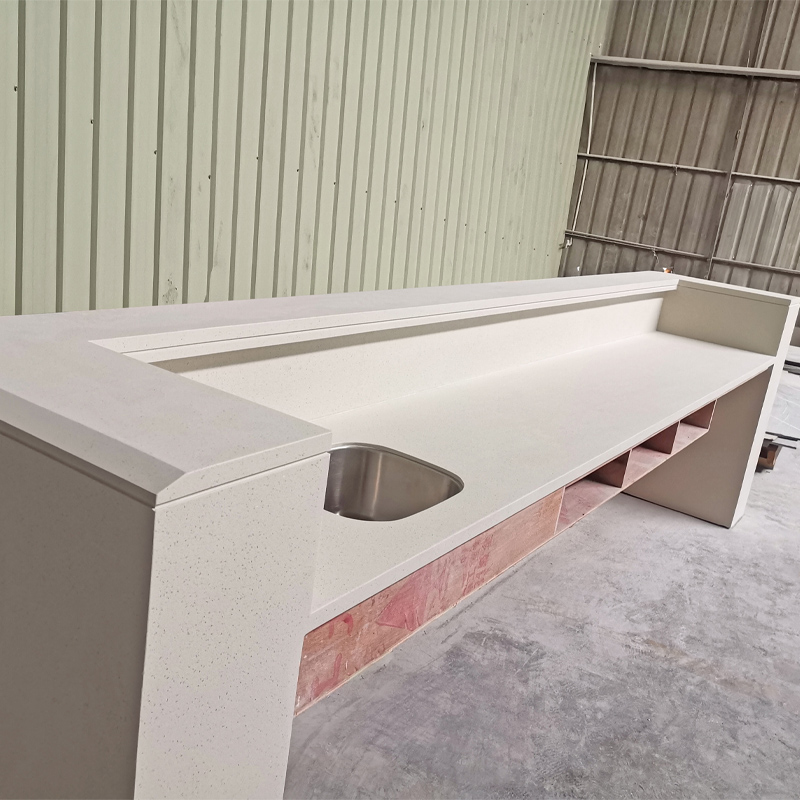
In an era where sustainability takes center stage, modern home design increasingly values materials that combine functionality, aesthetics, and environmental responsibility. Among these, Artificial Stone Countertops stand out as a prime example of innovation meeting eco-consciousness. This article explores the sustainable features of Artificial Stone Countertops, focusing on their use of recycled materials, low-pollution manufacturing processes, durability, and potential for reuse.

Artificial Stone countertops are crafted using a blend of resin, quartz sand, and mineral fragments. Many manufacturers are committed to incorporating recycled materials such as reclaimed stone powder and industrial by-products into their production processes.
Reducing Material Waste: By repurposing waste stone and mineral particles, artificial stone minimizes the need for mining and reduces environmental disruption.
Lowering Resource Consumption: Synthetic production methods use fewer natural resources compared to quarrying and transporting natural stone.
Additionally, many artificial stone products are made from materials certified for their environmental friendliness, ensuring a greener choice for consumers.
The manufacturing process for artificial stone countertops is designed to be energy-efficient and environmentally friendly.
Vacuum Casting Technology: Advanced techniques like vacuum casting help reduce dust and gas emissions during production.
Water Recycling Systems: Unlike natural stone cutting and polishing, which consume significant water resources, artificial stone production emphasizes water reuse and recycling.
Low-VOC Resins: Modern artificial stone countertops use low-volatile organic compound (VOC) resin formulations, reducing indoor air pollution and overall environmental impact.
These measures significantly lower the carbon footprint of artificial stone manufacturing, making it a sustainable alternative in the home improvement market.
Artificial stone countertops are renowned for their durability, boasting excellent resistance to scratches, heat, and stains.
Less Frequent Replacement: Their long lifespan reduces the need for frequent replacements, decreasing the overall consumption of resources and energy.
Low Maintenance Needs: With a non-porous surface, artificial stone countertops resist bacteria and stains, reducing the dependence on chemical cleaning agents that can harm the environment.
This exceptional durability makes artificial stone countertops a cost-effective and eco-friendly investment for homeowners.
The recyclability of artificial stone countertops enhances their sustainability credentials.
Reprocessing and Reuse: Discarded Artificial Stone Materials can be crushed and repurposed into new countertops or other construction products.
Low-Impact Disposal: Some advanced artificial stone products feature biodegradable components, reducing their environmental impact at the end of their life cycle.
By fostering a circular economy, artificial stone manufacturers are paving the way for reduced waste and resource optimization.
A growing number of artificial stone products have achieved certifications such as LEED and GREENGUARD, underscoring their contributions to improved indoor air quality, resource conservation, and energy efficiency.
Promoting Sustainable Homes: Artificial stone countertops are increasingly recommended as part of green building initiatives and eco-friendly home designs.
Driving Innovation: Emerging technologies, such as recyclable resins and zero-waste production processes, are expected to further enhance the environmental performance of artificial stone.
Artificial Stone Countertops not only offer outstanding versatility and aesthetic appeal but also exemplify a commitment to sustainable manufacturing and a low carbon footprint. From the use of recycled materials to energy-efficient production processes and long-lasting durability, these countertops embody the principles of eco-friendly living.
Choosing artificial stone countertops is more than a practical and stylish decision—it’s a conscious effort to support sustainability and reduce environmental impact. With ongoing advancements in technology and manufacturing, artificial stone countertops are set to play an even more significant role in creating greener homes and lifestyles.